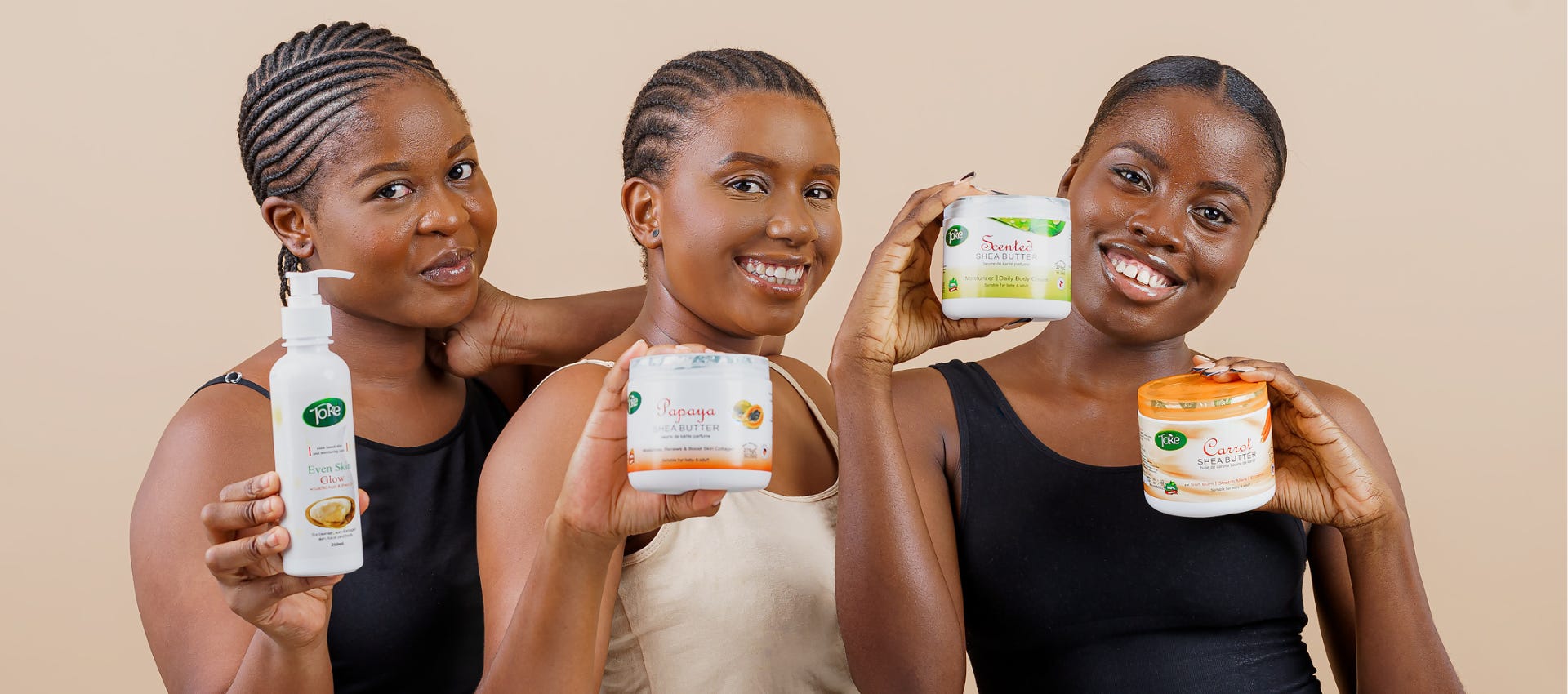The Green Gold: How Africa’s Shea Butter Industry Empowers Women and Fuels Global Beauty Trends
(9).jpeg)
Across Africa, particularly in Ghana and Nigeria, a golden commodity is transforming lives and reshaping global beauty markets; shea butter. Known locally as "women's gold," this natural product is more than a skincare essential; it is a symbol of tradition, sustainability, and economic empowerment. For centuries, African communities have harvested shea nuts, passing down techniques from one generation to the next. Today, this age-old practice has evolved into a multibillion-dollar industry, connecting rural women to international markets and giving Africa a powerful voice in global trade.
Shea Butter: From Ancestral Knowledge to Global Beauty
Shea butter, extracted from the nuts of the Vitellaria paradoxa tree, thrives in the "shea belt" stretching across West Africa. For generations, African women have used it for cooking, healing wounds, and moisturizing skin. In rural Ghana, the butter is still produced using traditional hand-crafted methods; roasting, grinding, and kneading that preserve its natural nutrients.
The global beauty industry has embraced shea butter for its rich content of vitamins A, E, and fatty acids. Brands like L’Occitane and The Body Shop source it directly from African cooperatives, recognizing its premium quality. According to Allure, the demand for ethically sourced shea has surged, transforming it into a cornerstone ingredient in lotions, hair products, and cosmetics worldwide.
Beyond skincare, shea butter’s versatility has earned it a place in pharmaceuticals, food processing, and even chocolate production, where it is sometimes used as a cocoa butter substitute. This multifaceted usage underlines why global corporations consider it an essential commodity in multiple industries.
Empowering Women Through Shea Production
The shea butter industry is not just about beauty; it’s about empowerment. In northern Ghana, women’s cooperatives control much of the shea trade. Organizations like the Global Shea Alliance report that nearly 16 million African women are directly involved in shea collection and processing. These cooperatives provide women with stable income, enabling them to support families, pay school fees, and invest in community development.
(11).jpeg)
Image source: Google
By owning the production process, women reclaim economic agency in traditionally patriarchal societies. In Burkina Faso, Nobel Laureate Wangari Maathai highlighted how sustainable shea production supports both women’s rights and environmental conservation. Furthermore, initiatives like the Savannah Fruits Company help women negotiate fair trade contracts, ensuring they receive a just share of profits.
The empowerment story goes beyond economics. Women engaged in shea butter production also gain leadership skills, manage cooperative governance, and participate in decision-making that affects their communities. The process transforms them from passive workers into active entrepreneurs shaping Africa’s economic future.
Challenges Facing the Industry
Despite its growth, the shea sector faces significant hurdles. Climate change threatens shea trees, which require specific environmental conditions to thrive. Deforestation and unsustainable farming practices reduce tree density, impacting yields. Moreover, rural women often lack access to modern equipment, making production labor-intensive.
Market exploitation is another concern. Middlemen sometimes purchase shea at unfairly low prices, cutting women out of the value chain. According to a World Bank report, only a small fraction of the final retail price reaches producers. This underscores the need for policies promoting direct trade, cooperative strength, and local processing.
Logistical barriers also hinder growth. Poor road networks in rural areas make transporting shea nuts to processing centers costly and time-consuming. Additionally, limited access to financial credit prevents women from investing in improved processing technologies. Addressing these issues requires both government intervention and private-sector support.
Culture
Read Between the Lines of African Society
Your Gateway to Africa's Untold Cultural Narratives.
Innovation, Sustainability, and the Future
The future of Africa’s shea industry lies in innovation and sustainability. Young entrepreneurs in Ghana and Nigeria are launching brands that use locally processed shea, reducing dependency on foreign buyers. For instance, Skin Gourmet, a Ghanaian-owned company, exports raw and processed shea to international markets while maintaining ethical sourcing standards.
Environmental sustainability is also gaining momentum. NGOs encourage tree planting and conservation to protect the shea belt. Women are adopting eco-friendly processing techniques that reduce waste and preserve tree populations. Organizations such as Tree Aid are helping rural communities plant thousands of shea trees, combating deforestation and strengthening ecosystems.
Technological innovations such as solar-powered processing units are being introduced in some regions, cutting down manual labor while increasing efficiency. These advancements not only improve production but also reduce carbon footprints, aligning with global environmental goals.
Global Recognition and Cultural Pride
As the world becomes more conscious of ethical sourcing, African shea butter is celebrated not only for its quality but also for its cultural significance. The United Nations Development Programme (UNDP) has supported projects that link shea production to sustainable development goals, highlighting its role in poverty reduction and gender equality.
Shea butter has also become a cultural ambassador. When global consumers choose African-made shea products, they participate in a story of resilience, tradition, and pride. This narrative shifts Africa’s role in the beauty industry from supplier to innovator.

image source: Toke cosmetics
The rise of African-owned beauty brands such as R&R Luxury in Nigeria and Nku Naturals in Ghana proves that the continent is capable of not just supplying raw materials but also producing high-end, finished goods that compete on the global stage.
Africa’s Green Gold and Its Global Future
The shea butter industry exemplifies how Africa’s natural resources, when managed sustainably and ethically, can drive economic growth and empower marginalized communities. Women at the heart of this industry are not only producing a globally coveted product but also shaping Africa’s socio-economic landscape.
As awareness grows, and ethical consumerism expands, the demand for African shea will continue to rise. Governments, NGOs, and private companies must collaborate to ensure women producers receive fair compensation and environmental protection remains a priority.
Looking ahead, shea butter has the potential to become a flagship product representing Africa’s ability to combine tradition, innovation, and economic success. The industry’s success story is not just about profits, it’s about dignity, heritage, and sustainable progress.
In the coming years, shea butter could become not just a product but a symbol of Africa’s potential, rooted in tradition, blossoming with innovation, and radiating across the world. As African women continue to lead this transformation, their voices, hands, and efforts will define the future of this green gold.
You may also like...
If Gender Is a Social Construct, Who Built It And Why Are We Still Living Inside It?

If gender is a social construct, who built it—and why does it still shape our lives? This deep dive explores power, colo...
Be Honest: Are You Actually Funny or Just Loud? Find Your Humour Type

Are you actually funny or just loud? Discover your humour type—from sarcastic to accidental comedian—and learn how your ...
Ndidi's Besiktas Revelation: Why He Chose Turkey Over Man Utd Dreams

Super Eagles midfielder Wilfred Ndidi explained his decision to join Besiktas, citing the club's appealing project, stro...
Tom Hardy Returns! Venom Roars Back to the Big Screen in New Movie!

Two years after its last cinematic outing, Venom is set to return in an animated feature film from Sony Pictures Animati...
Marvel Shakes Up Spider-Verse with Nicolas Cage's Groundbreaking New Series!

Nicolas Cage is set to star as Ben Reilly in the upcoming live-action 'Spider-Noir' series on Prime Video, moving beyond...
Bad Bunny's 'DtMF' Dominates Hot 100 with Chart-Topping Power!

A recent 'Ask Billboard' mailbag delves into Hot 100 chart specifics, featuring Bad Bunny's "DtMF" and Ella Langley's "C...
Shakira Stuns Mexico City with Massive Free Concert Announcement!

Shakira is set to conclude her historic Mexican tour trek with a free concert at Mexico City's iconic Zócalo on March 1,...
Glen Powell Reveals His Unexpected Favorite Christopher Nolan Film

A24's dark comedy "How to Make a Killing" is hitting theaters, starring Glen Powell, Topher Grace, and Jessica Henwick. ...
